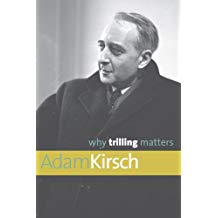Why Trilling Matters, Adam Kirsch, 2011
A rather densely argued book about Lionel Trilling, the quintessential literary critic of the 1940s through the 1960s, the first Jew in the English Department at Columbia and the classic liberal/neo-con New York intellectual. Kirsch argues that Trilling matters because of his insistence that literature matters, because he was existentially engaged with literature in an effort to create a self through and against the books he read. Trilling wrote that politics and society could only be understood through the literary imagination, the struggle resulting in a character based on moral realism, struggling with imperfection and complexity. Through his works on Matthew Arnold, E.M. Forster and others, Trilling viewed art as violence not justice and embraced Modernism’s greats (Yeats, Eliot, Proust, Joyce, Mann, Kafka, Rilke, Gide, Lawrence) for their hostility to convention. Other influences were William Blake, Freud, Nietzsche, all of whom engender discontent with our conventional lives, leading to the need for self-affirmation, choice, and making oneself through literature. He came into contact in the ’70s with Sontag and others whose culture of pluralism, tolerance and diffidence clashed with his art as consumer product rather than unsettling stimulus. Excellent heavy lifting!



